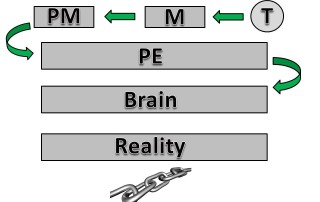The following is a very brief excerpt from my book, “This is Not That” due to be completed in 2048, based on the current pace. Let me know what you think. “In a rather complicated study, Professor D.B. Fenker and his colleagues (2005) had subjects view a series of emotionally neutral words on a computer screen. Randomly, some words were preceded by pictures of fearful faces or other disturbing images. The exposure to these images, however, was so quick that the individual was not aware that they had even seen the image, referred to popularly as subliminal images. Participants were later shown lists of words and asked to say whether they recalled seeing a word (had a conscious memory of learning it) or knew they had seen the word (they knew they had seen it before but couldn’t remember where or when). The researchers found that when words were preceded by a frightening or unpleasant image, they were more accurately recognized, though not consciously recalled. The implications of this study, and others like it, are momentous. If the brain is so sensitive to negative stimulation as to react in such a powerful way to such an insignificant trigger, imagine its […]
Perspective: The Gatekeeper
Often we are hard on ourselves when we don’t need to be, particularly when it comes to how much things that have happened to us continue to affect us. We like to think that we can just let things go, move on, and get over it but that’s just not how things actually work. Our past experiences continue to affect our current perception of events unless we actively try to overcome this natural tendency. Similarly, it is very difficult for a tall building to stand straight when the foundation is crooked. The only way to straighten the building is to work on the foundation, not the 30th floor. Often, when discussing current struggles with my clients, they will remark that they feel a lot of anxiety or depressed feelings “for absolutely no reason”. This is rarely the case. It is more accurate to say that they are feeling anxiety for no known reason, or no current reason. There’s always a reason. One way that is helpful for people to unlock the true impact of the past on their present is to get them to see it from outside of themselves. No, this does not involve high doses of hallucinogenic mushrooms, […]
10 Things Not to Say to Someone Suffering From Depression
Depression is no joke. Which is ironic, given how many people mask it with humor, as the recent case of Robin Williams sadly demonstrates. I find it sadly amusing how many experts there are out there when it comes to dealing with the complex interplay between, society, psychology, and our internal biochemistry. Most of these experts are more than willing to share their homespun advice for the rest of us but the reality is that when it comes to helping someone who suffers from major depressive disorder, it’s rarely that simple. For example, try to avoid these common well-intentioned, yet potentially harmful pieces of wisdom: 1. Cheer up This is not useful advice. It’s like telling a sick person to be healthy. If that were possible, they wouldn’t be sick in the first place. Also, you don’t know the reasons behind the depression. Someone once tried to encourage a client of mine to smile more, seeing only their downcast face and negative body language. What they didn’t realize is that this person’s child had just committed suicide. “Cheer up” is an imperative that no one has the right to issue. 2. You Just Need to Find a Hobby To quote […]
Playing Dead Emotionally: How Numbing Your Pain Can Be a Curse (and a Blessing)
Fight, Flight and … Freeze? Most people have heard of the “fight or flight” response. It is the body’s naturally hard-wired way of dealing with threats to one’s safety. I have written about it before, a few times, so I won’t go into it again but today I’m going to mention the third part of this response: freeze. In nature, animals typically go to flight first, since they are free of ego and have nothing to prove, only to enhance their own chances of survival. If they can’t go to flight and escape danger, they will go to fight, posturing and growling in hopes of scaring off the threat. If this fails, they will actually engage in aggressive behavior, albeit defensive aggression. Once these two options are unsuccessful, or if they are unavailable, most species have a form of reflexive behavior that could be termed “playing dead”. Playing Dead Emotionally Since most of the threats people face in our neck of the woods are social or emotional (although many do face actual physical threats in many forms), the freeze response may look a bit different than it does for a possum or cat. In our case, we tend to play […]











Recent Comments